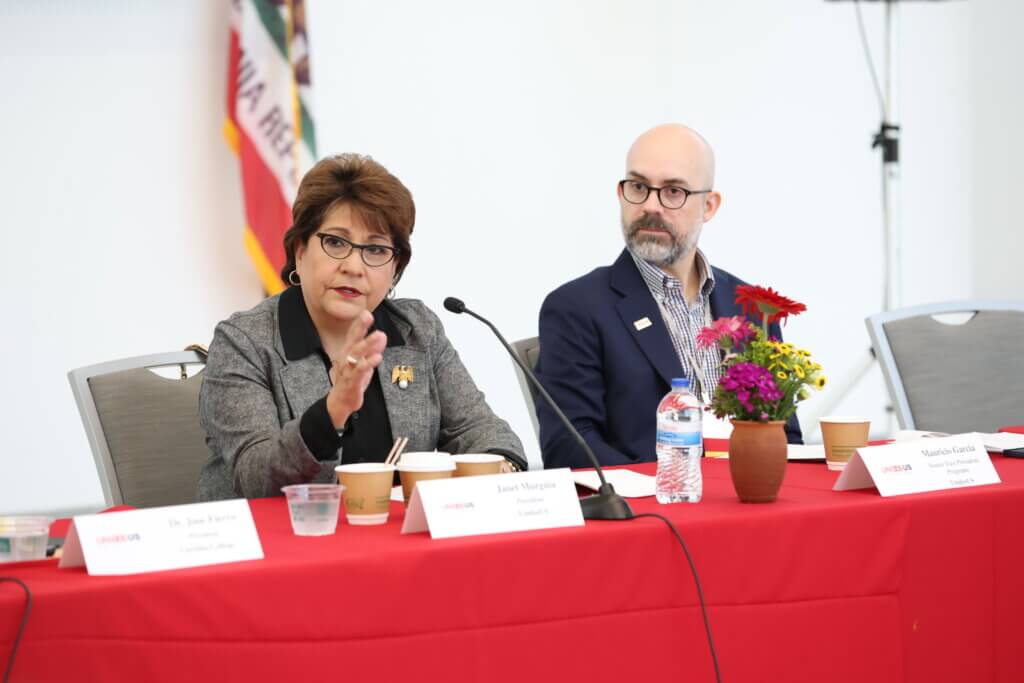The Retention and Completion Fund is Key to Supporting Latinx Higher Education Students
In April, President Biden put forward the American Families Plan—a plan that would make substantial investments in what has been coined our “human infrastructure.” A large part of the plan aims to make higher education more affordable and accessible. It includes increasing the maximum Pell Grant, funding for Minority-Serving Institutions (MSIs) including Historically Black Colleges and Universities (HBCUs), Tribal Colleges and Universities (TCUs), and tuition-free community college.
The Plan also includes a first-of its-kind federal investment that would mark a shift in focus of federal higher education policy from institutions simply enrolling students to making sure students successfully get through college and earn a degree. The $62 billion grant program—a top education priority for UnidosUS—would invest in evidence-based retention and completion activities at colleges and universities that serve high numbers of low-income students.
“States, territories, and Tribes will receive grants to provide funding to colleges that adopt innovative, proven solutions for student success, including wraparound services ranging from childcare and mental health services to faculty and peer mentoring; emergency basic needs grants; practices that recruit and retain diverse faculty; transfer agreements between colleges; and evidence-based remediation programs,” the Plan states.
Congress is now in the process of advancing the American Families Plan through budget reconciliation—an expedited legislative process that allows lawmakers to pass funding legislation by a simple majority in both chambers of Congress. The recent House Education and Labor FY22 Budget Reconciliation legislation included $9 billion for the program (under the title of Retention and Completion Grants). While far from the president’s proposed $62 billion, it is critical that at least the $9 billion included in the bill make it to the finish line.

The Retention and Completion Grants (also known as the College Completion Fund) would go a long way in narrowing the college completion gap between students of color, students from low-income backgrounds, first-generation students, and their wealthier white peers. For example, pre-pandemic, Latinx students had the largest attainment growth of any other racial or ethnic group, but they were still the least likely to earn a college degree. Between 1990 and 2016, Latinx enrollment in postsecondary programs increased by 337%—going from 782,400 to 3.4 million students. By 2018, Latinx students made up one in five students, but roughly 31% of Latinx adults have a college degree compared to 58% of white adults.
Once enrolled, Latinx students lag behind their wealthier and white peers in completing college. This is at no fault of their own. Latinx students must contend with the effects of deeply rooted inequities fueled by decades of systemic racism, discrimination, and one-size-fits-all policy approaches in higher education.
To make matters worse, COVID-19 has now put Latinx student enrollment gains in jeopardy, causing the first decline in Latinx enrollment in more than a decade, with fall 2020 seeing a 20% drop. This was higher than the national fall enrollment drop of 13%. Latinx students who were enrolled in the 2019 cohort experienced a 3.2 percentage point drop in their persistence and retention rates—more than double that of white, Asian, and Black counterparts. The Latinx transfer-out rate also fell by 1.7 percentage points to 6.6%, the lowest transfer-out rate compared white (9.7%), Asian (7.1%), and Black (8.8%) counterparts in the same cohort. More recent Spring 2021 data shows a continuous downward enrollment trend. Spring undergraduate enrollment for Latinx students declined by 7.3%, compared to the overall undergraduate enrollment drop of 5.9%.
The Retention and Completion Grants would provide funding for institutions of higher education to support Latinx and other underserved students to enroll, re-enroll, attend, and graduate from institutions of higher education. Based on an UnidosUS report, Following Their Dreams in an Inequitable System: Latino Students Share Their College Experience, we know that the Latinx higher education experience is substantially impacted by first-generation status and persistent financial insecurity, but Latinx students thrive when targeted institutional support is accessible.
In order for students to access the social and economic benefits that higher education can provide, they must complete their degree. But six years after entering college in 2014, 42% of Black students and 50% of Latinx students had completed degrees compared to 68% of white students—a completion gap of more than 18 points. These gaps create long-term disparities in debt, wealth accumulation, and economic security.
“What we’re seeing unfortunately across the nation is dire completion trends that are stratified along racial and ethnic and socio-economic lines,” UnidosUS Senior Policy Analyst, Amanda Martinez, told an audience of policymakers and other education stakeholders while participating in a panel discussion hosted by the Institute for Higher Education Policy calling for this once-in-a-generation investment in college retention and completion.
Congress can ensure that colleges have the resources to provide evidence-based academic and culturally relevant services that we know help students stay and complete their programs: activities such as direct support services, career coaching and networking opportunities, and career pathways through programs that serve and assist individuals from disadvantaged backgrounds, including Latinx students, as well as first-generation college students and students impacted by poverty. As Congress weighs the trade-offs between what investments will ultimately be included in a final reconciliation bill, this is one that should not be overlooked.
Author Roxanne Garza is an UnidosUS senior policy advisor.




